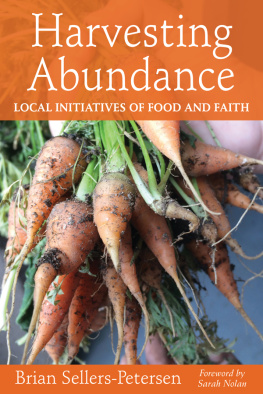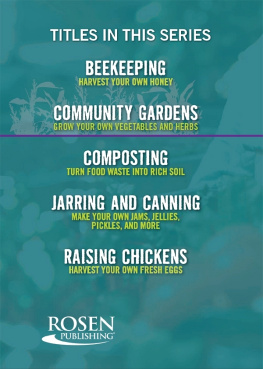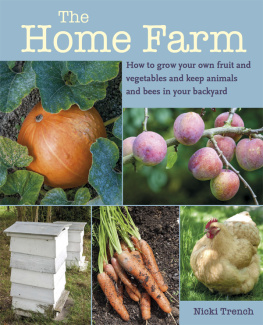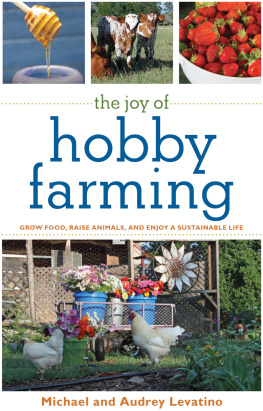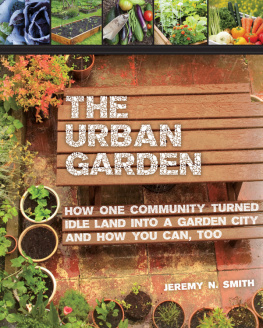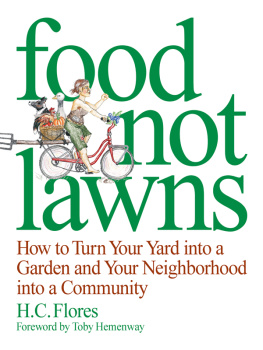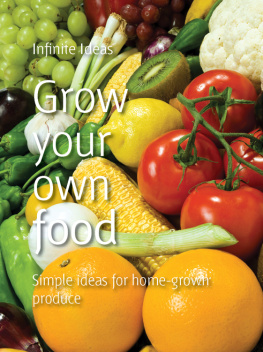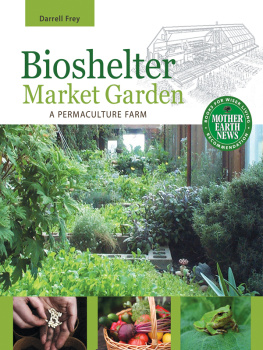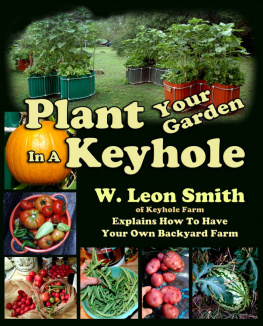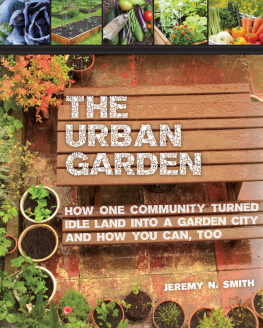Harvesting Abundance
LOCAL INITIATIVES OF FOOD AND FAITH
Brian Sellers-Petersen
Foreword by Sarah Nolan

To my colleagues at Episcopal Relief & Development, past and present
and
My extended family at St. Marks Cathedral, Seattle
and
Diocese of Olympia
Copyright 2017 by Brian Sellers-Petersen
All rights reserved. No part of this book may be reproduced, stored in a retrieval system, or transmitted in any form or by any means, electronic or mechanical, including photocopying, recording, or otherwise, without the written permission of the publisher.
Unless otherwise noted, the Scripture quotations contained herein are from the New Revised Standard Version Bible, copyright 1989 by the Division of Christian Education of the National Council of Churches of Christ in the U.S.A. Used by permission. All rights reserved.
Church Publishing
19 East 34th Street
New York, NY 10016
www.churchpublishing.org
Cover image Imago Dei Middle School, Tucson, Arizona. Used with permission.
Cover design by Jennifer Kopec, 2Pug Design
Typeset by Rose Design
Library of Congress Cataloging-in-Publication Data
Names: Sellers-Petersen, Brian, author.
Title: Harvesting abundance : local initiatives of food and faith / Brian Sellers-Petersen ; foreword by Sarah Nolan.
Description: New York : Church Publishing, 2017.
Identifiers: LCCN 2016057397 (print) | LCCN 2017011595 (ebook) | ISBN 9780819233103 (ebook) | ISBN 9780819233097 (pbk.)
Subjects: LCSH: CommunitiesReligious aspectsChristianity. | Community gardens. | FoodReligious aspectsChristianity. | Church workEpiscopal Church.
Classification: LCC BV625 (ebook) | LCC BV625 .S45 2017 (print) | DDC 261.8/326dc23
LC record available at https://lccn.loc.gov/2016057397
I f you have ever had the opportunity and pleasure of meeting Brian Sellers-Petersen, you quickly learn not only of his extensive interest in church gardens, farms, and food ministries, but of his deep desire to lift up the stories of these ministries and find ways to connect and support the people doing this transformative work. Harvesting Abundance is one piece of the legacy that Brian offers all of us in the Episcopal Church, sharing about the lives and stories of the incredible and mundane activities that witness to the Gospel of Jesus, our Baptismal Covenant to strive for justice and peace among all people, and commitment to the stewardship of all creation.
The first time I met Brian face to face, we talked baseball and chickens. It was spring of 2012, and our farm, The Abundant Table, was one of the early stops for Brians sabbatical, visiting many of the ministries highlighted in this book. Originating from a campus ministry in the Diocese of Los Angeles, The Abundant Table Farm Project was launched three years prior to Brians visit, in 2009. With five acres of land, a farm house, and six Episcopal Service Corps young adult interns our little ministry began a very exciting, bumpy, and life changing journey exploring what it means to be reconciled to God, neighbor, and the earth in the ways we worship, work, and live.
Since our first planting of radishes in 2009, The Abundant Table has impacted over 15,000 individuals in Ventura and Los Angeles County through our Farm to School, Farm Education, and Farm to Faith programs. Our worshipping community regularly welcomes groups as small as fifteen and as large as 250 people to various liturgical services, volunteer opportunities, Bible studies, and more.
The Abundant Table strives to spark a conversation in the church and the world about the power of growing and sharing food, and the complexity of the associated health and equity issues linked to these processes. We also seek to be a land-based experiential sanctuary for the Christian Church, enabling people of faith to find enrichment for their spiritual journey through a land-based encounter with the sacred. We believe renewal of our religious, civic, and ecological communities grows out of the marginal spaces of creativity, resistance and reconciliation.
It is this desire to spark a conversation in the wider Episcopal Church, that really brought Brian and I together for more than just a onetime meeting. Brian knows that the growing and sharing of food is an entry point to exploring what it means to care for creation, be concerned about issues of food justice, and practice hospitality. Standing in the backyard of the farmhouse, surrounded by chickens and compost, was the first of what would become many scheming and visioning conversations.
During my time as both an Episcopal Church Foundation Fellow and Episcopal Church Justice and Advocacy Environmental Stewardship Fellow, Brian has been a mentor, connector, and co-conspirator. Over the past five years, we have partnered with an amazing group of individuals all involved in different forms of agrarian ministry and theological work to build the Cultivate: Episcopal Food Movement, which Brian references in the books introduction.
Without Brians tireless work to map the over five hundred farm, garden, and food ministries in the Episcopal Church, the networks and support for these ministries that have been and are developing would not exist in the way they do today. Most of us who are currently part of Cultivate and other similar ministries, all share that we found our way to each other through Brians doing. Brian knows how much learning we can do from each other, and that the importance of sharing stories and encouraging the church to share more stories is essential to our transformation, renewal and resilience. Harvesting Abundance invites us to do just thatlearn from each other, be inspired by one another, and witness to the hope and resilience that is planted throughout the Episcopal Church.
Sarah Nolan
Director of Programs and Community Partnerships
The Abundant Table
T his book grew out of a 2012 sabbatical from working with Episcopal Relief & Development, an organization that has been my occupational home for the past sixteen years. I am particularly grateful to the president, Rob Radtke; the board of directors; and my colleagues and partners for their support and encouragement. Another group that made a large contribution to this book is the founding board of Cultivate: Episcopal Food Movement, especially my cochair, Sarah Nolan. Most importantly Im grateful for the patience and love of my wife, Pam, and our family.
I am grateful for the scores of gardeners, farmers, beekeepers, organizers, environmentalists, and others involved in faithful food movements who have contributed to this book by giving me tours, subjecting themselves to interviews, taking photos, becoming my e-mail pal, and sharing their stories. First and foremost, I especially give thanks for my editor (friend, encourager, confessor, and cheerleader) at Church Publishing, Sharon Pearson. Thank you Laura Ahrens, Andy Anderson, Devon Anderson, Susan Anderson-Smith, David Bailey, Carol Barnwell, Sarah Bartenstein, Jennifer Baskerville-Burrows, Kathleen Bean, Beth Bojarski, John Burruss, Lauren Carey, George Chlipala, Robin Denney, Taylor Devine, Pamela Dolan, Jim Eichner, Jim Goodman, Sister Catherine Grace, Ashley Graham-Wilcox, Holly Heine, Cynthia Hizer, Carolyn Hoagland, Bud Holland, Brian Hollstein, J. B. Hoover, Katharine Jefferts Schori, Beth Kelly, Lisa Kimball, Peter Lane, Margaret Larom, Sister Helena Marie, Mark Marshall, Melissa McCarthy, Marilyn McKinney, Alex Montes-Vela, Amanda Musterman, Katie Ong-Landini, Emily Portman, Lisa Ransom, Melissa Rau, Greg Rickel, Peter Rood, Joe Rose, Hunter Ruffin, Leon Sampson, Jim Schaal, Mary Frances Schjonberg, Richard Schori, Bill Slocomb, Rebecca Smith, Kris Stoever, Steve Thomason, Robert Two Bulls, Peter Walsh, Kim Washington, Carolyn White...

